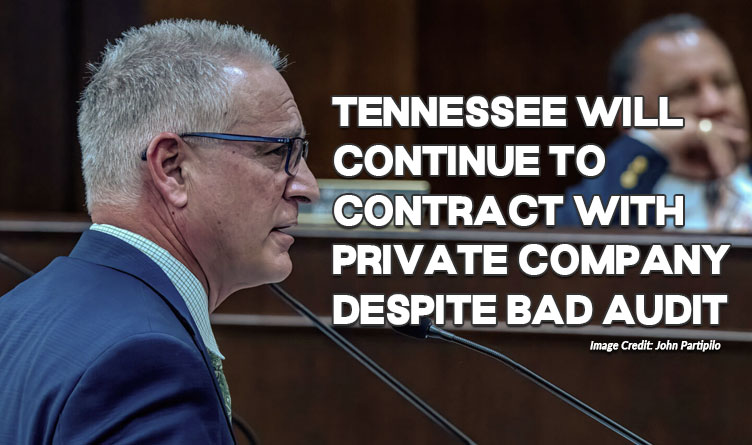CoreCivic’s turnover, vacancy rates much higher than those at state-run prisons.
Image: Frank Strada, commissioner of the Tennessee Department of Corrections, testifying before the Legislature’s Government Operations Committee on Dec. 13, 2023. Image Credit: John Partipilo
By Sam Stockard [Tennessee Lookout -CC BY-NC-ND 4.0] –
Despite an audit showing a 146% turnover rate for correctional officers at CoreCivic-run prisons in 2023, the state will continue to contract with the private company, Correction Commissioner Frank Strada said Wednesday.
“I look at the needs of the department and the services they provide, and I feel they’re a partner that the state needs in corrections,” Strada said after a hearing before the Legislature’s Government Operations Committee in which it had to answer questions about 10 findings in a Comptroller’s audit, some of them repeat findings from previous audits.
Strada, who was hired by Gov. Bill Lee nearly a year ago from Arizona, blamed much of the problem for CoreCivic’s turnover and a 30% vacancy rate for prison officers in state prisons on the difficulty in hiring correctional officers to work in a difficult setting, especially with potential employees taking jobs in the private sector.

Northwest Correctional Center in Tiptonville, for example, had a 60% vacancy at its facility in the last year. Personnel shortages there caused staff to feel unsafe because inmates were “out of control,” according to state auditors, who found 10 major problems in their investigation. In spite of those shortcomings, the Government Operations Committee voted to extend the department for three years and require a one-year review.
CoreCivic, which has spent $3.3 million on lobbying and donations to Tennessee lawmakers since 2009, runs four of the state’s 14 prisons, including Trousdale Turner in Middle Tennessee and South Central Correctional Facility in Clifton where the State Building Commission approved an $8 million increase this year that bumped the total payout there to $219.9 million. The pay increase came even though CoreCivic has paid $20 million in liquidated damages in the last few years for failing to meet contract requirements, mainly through staff shortages.
The parents of three inmates who died in CoreCivic-run prisons over four months in 2021 accused the private company of putting profits ahead of safety and failing to oversee guards and took legal action.
Because of staff shortages, the Department of Correction was unable to assign officers to critical and non-critical posts, and CoreCivic had nearly double the posts empty during the same time frame, according to the state audit.
As a result, officers have to work overtime, sometimes up to 70 hours a week. The department also was forced to use personnel such as attorneys and accountants to work extra hours as correctional officers and pay them at a higher rate, which was funded through vacant positions.
Because of the high vacancy rate at prisons such as Northwest Correctional, Strada told lawmakers the department offers bonuses and stipends, in addition to the “augmentee” program that uses non-trained personnel, and invested $4 million for metal detectors, pepper spray, protective vests and other gear.
“This is not something that can easily go away just by tweaking a few things,” said Strada, who also told lawmakers things aren’t as bad as they seem.

State Rep. John Ray Clemmons, a member of the Government Operations Committee, pointed out the Department of Correction had a similar audit a few years ago and noted that “nothing changes fundamentally.”
The Nashville Democrat said, “CoreCivic and privatized prisons are a cancer on our penal systems.”
The company has revenue exceeding more than $1 billion nationally and ships people in from out of state who stay in local hotels, work at Trousdale Turner, then leave, according to Clemmons. The department acknowledged the turnover rate is high at the privately-run prison because of constant movement of correctional officers.
Strada responded, though, that the department had “cleared up 80%” of the problems found in CoreCivic prisons with the last audit by improving officer safety and conducting surprise prison visits. During an unannounced visit, he said, the department found in most cases inmates were “trying to get more money from their families.” He also contended the homicide rate at CoreCivic prisons dropped 60% last year.
Democratic Sen. Charlane Oliver, however, said the state needs to find another way to penalize CoreCivic because the liquidated damages are a “slap on the wrist.”
In its litany of problems, the audit found state prisons have long waiting lists for behavioral health and education programs and that management failed to make sure offenders were released from prisons with the necessary paperwork and referrals needed for “successful re-entry” into communities.

Additionally, the state failed to follow the Prison Rape Elimination Act and in some instances the department and CoreCivic housed potential “aggressors” in the same cells with potential victims of sexual abuses.
A repeat finding from an audit three years ago also determined the department and CoreCivic failed to investigate instances of sexual abuse and sexual harassment based on federal standards.
Department of Correction Deputy Commissioner Linda Thomas acknowledged the state has problems in the Prison Rape Elimination program but set up procedures to stop putting “aggressors” in the same cells with potential victims.
“Some of our problems are self-imposed,” Thomas said, adding the state’s guidelines are tougher than the federal rules.
The audit, though, found CoreCivic closed 15 investigations before receiving rape kit results from the Tennessee Bureau of Investigation and five rape kits were never submitted to the agency.
Auditors also determined management didn’t record or take disciplinary action for 28 substantiated rape offenders and four staff perpetrators.
Sen. Oliver raised questions about whether CoreCivic is breaching its contract when falling out of compliance with the federal law dealing with prison rape.
Republican Sen. Kerry Roberts of Springfield pointed out that the audit finding dealing with rape is especially problematic because it wasn’t solved after the last audit.
“This is one we really want to put an emphasis on,” Roberts said.
In spite of the audit’s findings about rape incidents, Strada said afterward, “We look at every incident that occurs in our state and private-run facilities and do an investigation to take the appropriate action based on the investigation.”


About the Author: Sam Stockard is a veteran Tennessee reporter and editor, having written for the Daily News Journal in Murfreesboro, where he served as lead editor when the paper won an award for being the state’s best Sunday newspaper two years in a row. He has led the Capitol Hill bureau for The Daily Memphian. His awards include Best Single Editorial from the Tennessee Press Association. Follow Stockard on Twitter @StockardSam



2 Responses
That’s the way, keep doing the same old, same old and expect a different result. No harm no foul because it’s not coming out of their pockets. In the words of that famous philosopher, Forrest Gump, “Stupid is as stupid does”
Ralph.
PRECISELY.